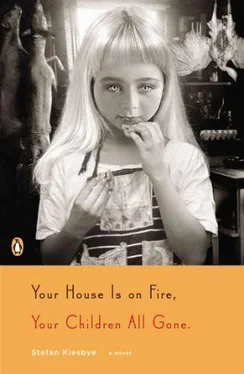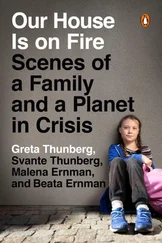I stole myself away and learned how to braid Linde’s hair. It was brown and heavy, and Anke showed me how to do it and laughed at me when I was done. The braids weren’t the same length and looked silly. Linde said it wasn’t so bad.
When the Hoffmanns finally sent me home, my mother’s kitchen was still brightly lit. My father crept into my bed after midnight and whispered, “Martin, move over, and for heaven’s sake don’t go downstairs.”
What had Hemmersmoor done to deserve such a sunny day? Our climate was as rainy and dreary as any, but I can’t remember a single Thanksgiving ruined by dark clouds and showers. Unfailingly Sunday crept over the peat bog, and the sun drove us out of bed and into church. Starched shirts and ties and dresses that had not fit even the year before made mass uncomfortable, but by the time we were free to walk over to Frick’s Inn everyone’s mood was as mild as the September day. Only the owners of the Big House, which stood several kilometers outside our village, didn’t make an appearance. For such a family, the spectacle of our contest was a disgrace, and the thought that the von Kamphoffs should sit next to us on the wooden benches was ridiculous.
At one o’clock, with faces red from beer and Bommerlunder, the men led the way into the square, where the women had set up the different contests. The priest stuck red ribbons on the jurors’ lapels and blouses, and the fifteen men and women lined up for their right to the first taste. The rest of us awaited our turn to dig in. Anke and Linde stood with their parents; they were wearing white dresses, and their braids were wound around their heads in the same manner. They waved at me, and I almost ran over to them but stopped myself just in time, pretending not to have noticed them and hiding red-faced behind my father’s broad back.
The jurors ladled stew into their bowls and slurped and smacked their lips while making important faces. They had been drawn lottery-style, to preclude any misgivings. If you judged the contest one year, you were not eligible for jury duty the next.
Hemmersmoor had experienced its scandals. Nine years before, a farmer’s wife had bribed jurors and later been barred from the contest for life. Now Heidrun Brodersen’s three-year winning streak was the subject of terrible suspicion by those who had tasted her roast at one of the Brodersens’ dinners. Yet by and large the system had proved useful.
It came as a surprise then, when after half an hour of conscientious tasting, the newcomer Helga Vierksen’s stew was awarded first prize. Yes, the jurors had to be fair, but they were indebted to tradition. Awarding Vierksen first prize was a slap in Hemmersmoor’s face.
Even more surprising was that no one who had tasted her stew—with potatoes, carrots, and large, tender chunks of beef—protested. It seemed that even other contestants, among them staunch Hemmersmoor luminaries such as Rosemarie Penck, conceded defeat. Helga Vierksen’s pots of stew spoke a clear language—only hers were empty, as though licked clean by hundreds of cats.
Helga, a large woman with large breasts and a fine smile with most of her teeth still intact, accepted the wooden plaque and said a simple thank-you. She knew not to gloat. Her five young children, the oldest being one of my classmates, stood around her, demanding to hold the prize. The crowd applauded hesitantly but with conviction. We weren’t heartless.
The next contest produced Heidrun Brodersen’s fourth consecutive victory, which had her neighbors shaking their heads. Yet on a sunny September afternoon, who wanted to argue?
My mother’s face was so red when the final contest started, the skin stretched so tightly over her jaw, nose, and cheeks, I feared it might tear. All the while her false teeth kept grinning, with the gold wires of her dentures blinking in the light. Her twelve sheets of Butterkuchen outdid even the sun with their golden, buttery glow. The sugar sparkled.
And how we ate! We ate and ate, and sweat gathered on the fifteen jurors’ brows and foreheads. The baker Meier, accepting the challenge, had exceeded our already high expectations, but had he surpassed my mother? His larger sheets seemed the only distinction between his cake and his competitor’s.
So we ate more. We couldn’t leave this matter to whimsy. Coffee was being served, thanks to Frick’s generosity. All year he took what our fathers earned on the peat bog, but on Thanksgiving he gave back to everyone.
Around the time the jurors convened to decide on the winner, Jens Jensen, the old peat cutter, pointed at Otto Nubis and said, “Otto, your tongue is black.”
“No, yours is as black as tar,” Nubis, the foreman at Brümmer’s tool factory, shot back.
When the priest approached them—sensing that a fistfight, another staple of our September feasts, might be at hand—and tried to calm them, the two men turned on him, grabbed him, and held open his jaw. “Your tongue is as black as your coat.” And so it was. Soon we all stuck out our tongues, and they were black, every one of them. What had happened?
Our shock wore off soon. We knew this could have only one explanation. Even though we hadn’t experienced it ourselves, our history was clear on the matter: “For the first one death, for the second starvation, for the third one bread.” We had eaten bread all our lives, but stories of our forebears and their plight lived on, and we knew what some of the first settlers on the Devil’s Moor had done to save themselves from certain death. Now it had happened again. Our tongues were blackened because we had eaten human flesh.
Silence fell over the crowd, and all eyes searched for the contestants. My mother and the baker Meier did not come under suspicion, but where were the cooks of the roasts and stews?
“It’s Heidrun,” a voice cried. “That’s why she wins every year.” It was my father shouting. “I’ve eaten her roast, and it’s no good.”
“He’s right,” Bernd Fitschen cried. “It’s Heidrun. That’s why her roast is so tender.”
The accused was a fat and charming woman, who turned the heads of Hemmersmoor’s men. Her feet were stuck in the most fragile shoes I’d ever seen, and she was still holding on to her wooden plaque. “You ingrates,” she shrieked. “I’ve lived with you all my life, and you’re turning on me because your wives can’t cook.” Much of what she said after that was drowned out by cries to hack her to pieces. Until, in utmost despair, with a hundred hands grabbing her apron and dress, she shouted, “Why this time? You’ve eaten my roast before. It’s not me.”
While everyone was thinking about this, Heidrun took advantage of the break to continue. “It’s not me. It’s Helga. It’s the new one.”
Silence again. Hemmersmoor did not think fast on a full stomach. Yes, Heidrun’s accusation made sense. Why else had Helga entered the contest but to poison us? Why else had we scraped her pots clean? Yes, Helga, the new one, was the culprit. People let go of Heidrun.
Her cries, her begging, her shrill voice didn’t help Helga one bit and stopped no one, and when the village was done with her and her children, the bodies shapeless, resembling five small and one large bag filled with rags, sticks, and stones, my father led the way to Helga’s house.
We set fire to home and barn. Helga’s husband—having admitted his guilt by staying home—was struck down with an axe and dragged back into the house, where his remains were buried under falling beams and collapsing walls. The whole village watched and cheered the fire and helped a neighbor when flames from Helga’s barn began licking his own.
After the pangs and the hissing had finally died down though, an eerie silence fell over the village. Our tongues were still black, but our rage had subsided. We stood around the still smoldering house like children, embarrassed, silent, but ready to attack anyone who would point a finger. The boys and girls of the village had screamed so much they had lost their voices and were now searching the ashes for little treasures. Anke and Linde stood to one side. They had pulled a badly singed hat with a colorful bow and a necklace with a green stone from Helga’s house, and their white dresses were soiled and their braids hung limply at their sides.
Читать дальше












